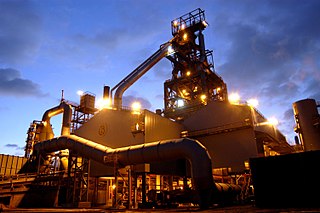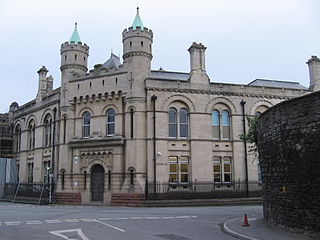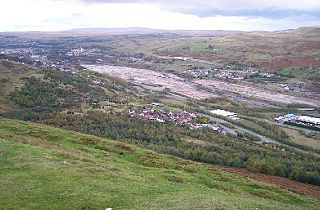
British Steel was a major British steel producer. It originated from the nationalised British Steel Corporation (BSC), formed in 1967, which was privatised as a public limited company, British Steel plc, in 1988. It was once a constituent of the FTSE 100 Index. The company merged with Koninklijke Hoogovens to form Corus Group in 1999.

Edgeworth Lysaght, later Edward Anthony Edgeworth Lysaght, and from 1920 Edward MacLysaght, was a genealogist of twentieth-century Ireland. His numerous books on Irish surnames built upon the work of Rev. Patrick Woulfe's Irish Names and Surnames (1923).
GKN Ltd is a British multinational automotive and aerospace components business headquartered in Redditch, England. It is a long-running business known for many decades as Guest, Keen and Nettlefolds. It can trace its origins back to 1759 and the birth of the Industrial Revolution.
Sidney Royse Lysaght was a British writer of Irish ancestry.

An ironworks or iron works is an industrial plant where iron is smelted and where heavy iron and steel products are made. The term is both singular and plural, i.e. the singular of ironworks is ironworks.

Tata Steel Europe Ltd. was a steelmaking company headquartered in London, England, with its main operations in the United Kingdom and the Netherlands. The company was created in 2007, when Tata Group took over the British-Dutch Corus Group.

The Dowlais Ironworks was a major ironworks and steelworks located at Dowlais near Merthyr Tydfil, in Wales. Founded in the 18th century, it operated until the end of the 20th, at one time in the 19th century being the largest steel producer in the UK. Dowlais Ironworks were the first business to license the Bessemer process, using it to produce steel in 1865. Dowlais Ironworks was one of the four principal ironworks in Merthyr. The other three were Cyfarthfa, Plymouth, and Penydarren Ironworks. In 1936 Dowlais played a part in the events leading to the abdication crisis of Edward VIII, when the King visited the steelworks and was reported as saying that "these works brought these men here. Something must be done to get them back to work", a statement which was seen as political interference. The steelworks finally closed in 1987.

The Brymbo Steel Works was a former large steelworks in the village of Brymbo near Wrexham, Wales. In operation between 1796 and 1990, it was significant on account of its founder, one of whose original blast furnace stacks remains on the site.
Lysaght was founded in 1880 by John Lysaght as a subsidiary to the company John Lysaght and Co. The company pioneered modern steel coating technologies (galvanization). Its coated steel building products were sold under the 'ORB' brand and contributed to Australian architectural style.

The St Vincent's Works is a former factory and offices at Silverthorne Lane in Bristol, England.

Ebbw Vale Steelworks was an integrated steel mill located in Ebbw Vale, South Wales. Developed from 1790, by the late 1930s it had become the largest steel mill in Europe. It was nationalised after World War II. As the steel industry changed to bulk handling, iron and steel making was ceased in the 1970s, and the site was redeveloped as a specialised tinplate works. It was closed by Corus in 2002, but is being redeveloped in a joint partnership between Blaenau Gwent Council and the Welsh Government.

Scunthorpe General Hospital is the main hospital for North Lincolnshire. It is situated on Church Lane in the west of Scunthorpe, off Kingsway, and north of the railway.

William Sandford was an English-Australian ironmaster, who is widely regarded as the father of the modern iron and steel industry in Australia.
William Royse Lysaght was an English steel manufacturer and collector of bird specimens.

The Yorkshire Engine Company Half Janus is a 0-6-0 wheel arrangement, diesel electric shunting locomotive which weighs 31 long tons with a maximum speed of 20 mph. The Half Janus was built by the Yorkshire Engine Company in Sheffield between 1956 and 1965.

The Lithgow Blast Furnace is a heritage-listed former blast furnace and now park and visitor attraction at Inch Street, Lithgow, City of Lithgow, New South Wales, Australia. It was built from 1906 to 1907 by William Sandford Limited. It is also known as Eskbank Ironworks Blast Furnace site; Industrial Archaeological Site. The property is owned by Lithgow City Council. It was added to the New South Wales State Heritage Register on 2 April 1999.
Australian Iron & Steel was an Australian iron and steel manufacturer.

Sir Cecil Harold Hoskins (1889–1971) was an Australian industrialist associated with the iron and steel industry. He is notable mainly for the establishment of the steel industry at Port Kembla, the company Australian Iron & Steel, and its subsequent merger with BHP in 1935. He was also on the board of the Australian Mutual Provident Society for many years and was its chairman from 1947 to 1962. He is less well known for his involvement in centre-right political organisations and the scouting movement, and his interest in landscape gardens.















